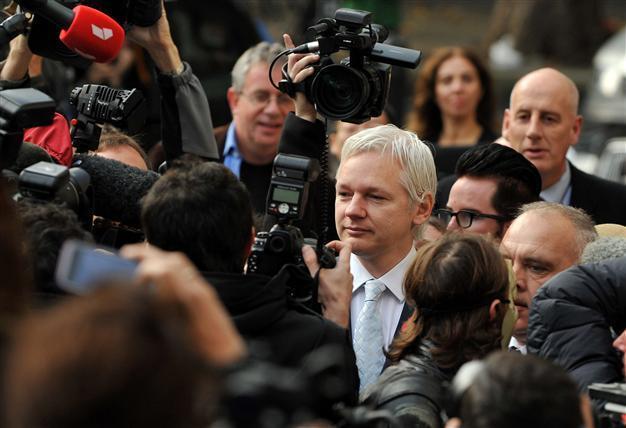WikiLeaks begins publishing two million Syria emails
LONDON - Agence France-Presse

AFP Photo
WikiLeaks yesterday began publishing more than two million emails from Syrian political figures which could shed light on a crackdown that has killed thousands.
The whistleblowing website said the first emails from Syrian political figures, ministries and companies were from August 2006 and the final ones dated March 2012, a year after the current bloody uprising in
Syria began.
"The material is embarrassing to Syria, but it is also embarrassing to Syria's external opponents," said WikiLeaks founder Julian
Assange, who is currently holed up in Ecuador's embassy in London seeking political asylum.
"It helps us not merely to criticise one group or another, but to understand their interests, actions and thoughts," he added in a written statement read out at a press conference in London.
"It is only through understanding this conflict that we can hope to resolve it." The latest disclosures could illuminate the workings of the Syrian regime and its interactions with allies in the run-up to and during the 16-month conflict, which the Syrian Observatory for Human Rights says has claimed more than 16,500 lives.
The first wave of emails released Thursday claimed that Italian defence giant Finmeccanica continued to supply support for communications equipment to the Syrian regime after the unrest began in March last year.
The contract to supply the Syrian Wireless Organisation with high-tech radios made by Selex Elsag, a branch of Finmeccanica, dates to 2008, according to the emails published in Italy's Espresso magazine and by Spanish website Publico.
But Selex continued supplying engineers and assistance on the radios until recently, said the publications, two of WikiLeaks' media partners for the project it has dubbed "the Syria Files".
WikiLeaks' announcement comes a day after Russia denied having discussed with Washington offering exile to Syria's President Bashar al-Assad.
It also comes ahead of a meeting Friday in Paris of the "Friends of Syria" group of countries which support tougher action against Assad's government.
WikiLeaks said the 2,434,899 emails came from Syrian ministries including foreign affairs, finance and presidential affairs. There are around 400,000 emails in Arabic but also 68,000 in Russian.
WikiLeaks spokeswoman Sarah Harrison said it could not comment on the full contents of the release.
The organisation said it is working with media partners Al-Akhbar in Lebanon, Al Masry Al Youm in Egypt, the Associated Press newswire, Espresso in Italy, NDR/ARD in Germany, Owni in France and Publico in Spain.
It has previously worked with media organisations including the New York Times and Britain's Guardian but these relationships later soured.
At a press conference in London to reveal the publication, Harrison refused to say how WikiLeaks had obtained the emails, telling AFP: "We never comment on our sourcing." In Beirut, Al-Akhbar, which is seen as a supporter of the Damascus government, said it "will work with WikiLeaks over the coming weeks to release a large number of emails detailing the inner workings of Syria's political and business elite." "It is a sensitive time in Syria and it is important to sort out what is real and what is fabricated," Al-Akhbar's chief editor Ibrahim al-Amin said, according to the newspaper's website.
WikiLeaks' latest publication comes amid continued wrangling among world powers about how the Syrian conflict should be tackled.
Russia has indicated it will stay away from the Paris meeting on Friday after accusing the West of seeking to distort a deal struck last weekend for a political transition in Syria.
Moscow's move to shun the gathering comes after UN-Arab League peace envoy Kofi Annan stressed that a ceasefire was imperative.
Assange, meanwhile, has been inside the Ecuadorian embassy since June 19 in a bid to avoid extradition to Sweden, where he is wanted for questioning over allegations that he sexually assaulted two female former WikiLeaks volunteers.
Assange denies the allegations, which he says are politically motivated. The 41-year-old Australian fears he could be extradited from Sweden to the United States, where he claims he could face the death penalty.
WikiLeaks enraged Washington in 2010 by publishing a flood of secret documents about the wars in Iraq and Afghanistan, as well as more than 250,000 confidential US diplomatic cables.
